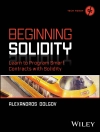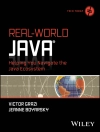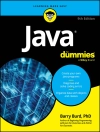Component Oriented Programming offers a unique programming-centered approach to component-based software development that delivers the well-developed training and practices you need to successfully apply this cost-effective method. Following an overview of basic theories and methodologies, the authors provide a unified component infrastructure for building component software using Java Beans, EJB, OSGi, CORBA, CCM, .NET, and Web services. You’ll learn how to develop reusable software components; build a software system of pre-built software components; design and implement a component-based software system using various component-based approaches. Clear organization and self-testing features make Component Oriented Programming an ideal textbook for graduate and undergraduate courses in computer science, software engineering, or information technology as well as a valuable reference for industry professionals.
Mục lục
Preface.
1. Introduction.
1.1 What is COP?
1.2 Why is COP important?
1.3 What is a component?
1.4 Hardware components and software components.
1.5 From OOP to COP.
1.6 Component-based software engineering.
1.7 Summary.
1.8 Self-review questions.
1.9 Exercises.
2. A Theory of Components.
2.1 Principles of COP.
2.2 Infrastructures of COP.
2.3 Component models.
2.4 Connection models.
2.5 Deployment models.
2.6 Unifying component technologies.
2.7 Summary.
2.8 Self-review questions.
2.9 Exercises.
3. COP with Java Beans.
3.1 Overview of Java Beans technology.
3.2 The component model of Java Beans.
3.3 The connection model of Java Beans.
3.4 The deployment model of Java Beans.
3.5 Examples and lab practice.
3.6 Summary.
3.7 Self-review questions.
3.8 Exercises.
4. Enterprise Java Beans Components.
4.1 The EJB a rchitecture.
4.2 The component model of EJB.
4.3 The connection model of EJB.
4.4 The deployment model of EJB.
4.5 Examples and lab practice.
4.6 Summary.
4.7 Self-review questions.
4.8 Exercises.
4.9 Programming exercises.
5. CORBA Components.
5.1 The COBRA component infrastructure.
5.2 The CORBA component model (CCM).
5.3 The connection model of CORBA and CCM.
5.4 The deployment model of CORBA and CCM.
5.5 Examples and lab practice.
5.6 Summary.
5.7 Self-review questions.
5.8 Exercises.
5.9 Programming exercises.
6. .NET Components.
6.1 The .NET framework.
6.2 The component model of .NET.
6.3 The connection model of .NET.
6.4 .NET component deployments.
6.5 Visual Studio .NET.
6.6 Examples and lab practice.
6.7 Summary.
6.8 Self-review questions.
6.9 Exercises.
6.10 Programming exercises.
7. COP with OSGi Components.
7.1 Overview of OSGi technology.
7.2 The component model of OSGi.
7.3 The connection model of OSGi.
7.4 The deployment model of OSGi.
7.5 Examples and lab practice.
7.6 Summary.
7.7 Self-review questions.
7.8 Exercises.
8. Web Services Components.
8.1 The Web Services framework.
8.2 The component model of Web Services.
8.3 The connection model of Web Services.
8.4 Web Services component deployment.
8.5 Examples and lab practice.
8.6 Summary.
8.7 Self-review questions.
8.8 Exercises.
8.9 Programming exercises.
Appendix.
Giới thiệu về tác giả
ANDY JU AN WANG, PHD, is Associate Professor of Software
Engineering at the School of Computing and Software Engineering,
Southern Polytechnic State University. In addition to teaching
graduate courses in component-based software development, Dr. Wang
has published more than thirty technical papers and has given
presentations at a number of national and international conferences
and universities.
KAI QIAN, PHD, is Professor and Department Chair of Software
Engineering at the School of Computing and Software Engineering,
Southern Polytechnic State University. He has taught
component-based software development courses and has completed a
number of research projects in component-based software
engineering. Dr. Qian has also published extensively in various
professional journals and international conference proceedings.












